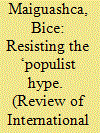|
|
|
Sort Order |
|
|
|
Items / Page
|
|
|
|
|
|
|
| Srl | Item |
| 1 |
ID:
051654


|
|
|
|
|
| Publication |
Dec 2003.
|
| Summary/Abstract |
For several decades after International Relations (IR) became a fully-fledged field of study at British and American universities, it worked with a relatively simple conceptualisation of 'politics' as such. In the international context, 'politics' involved an ongoing struggle for power among sovereign states, with war the worst-case outcome of this struggle. Power itself was defined essentially in terms of military and economic 'capabilities'. The fundamental structural condition of international anarchy meant that, in the absence of the kinds of constraints upon conflict that operate within states, only such crude mechanisms as a balance of power, or fragile institutions such as diplomacy or international law, served to impose some degree of order upon the system as a whole. While the Cold War brought an additional, ideological dimension to this struggle for power, in other respects it also simplified it by making it bipolar. Hence although much more was seen to be at stake in this contest than, for example, the nineteenth-century struggle for power in Europe, which gave the Cold War confrontation a zero-sum quality, the nature of the political processes at work was conceptualised in relatively straightforward terms. The 'high politics' of the global strategic contest between the superpowers not only transcended the 'low politics' of issues such as trade, they subsumed and gave a particular shape to numerous lesser conflicts in the Third World, which were frequently characterised as Cold War 'proxies'.
|
|
|
|
|
|
|
|
|
|
|
|
|
|
|
|
| 2 |
ID:
168875


|
|
|
|
|
| Summary/Abstract |
The purpose of this article is to offer a feminist critique of populism, not as a distinct mode of politics, but as an analytical and political concept. As such, it seeks to redirect our attention away from populism, understood as a politics ‘out there’, towards the academic theoretical debates that have given this analytical term a new lease of life and propelled it beyond academic circles into the wider public discourse. In this context, the article develops two broad arguments. The first is that the two prevailing conceptions of populism are marred by anaemic conceptions of power, collective agency and subjectivity and, as such, are unable to present us with a convincing account of why this form of radical politics emerges in the first place, who its protagonists are, and how they come together in collective struggle. The second is that our current frenetic deployment of the term as a blanket descriptor for radical politics of all persuasions does not bode well for feminism politically. For both reasons, I conclude that feminists need to resist the current ‘populist hype’.
|
|
|
|
|
|
|
|
|
|
|
|
|
|
|
|
|
|
|
|
|